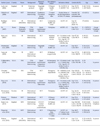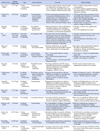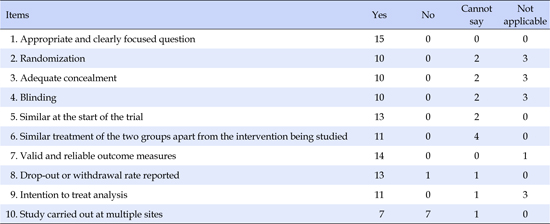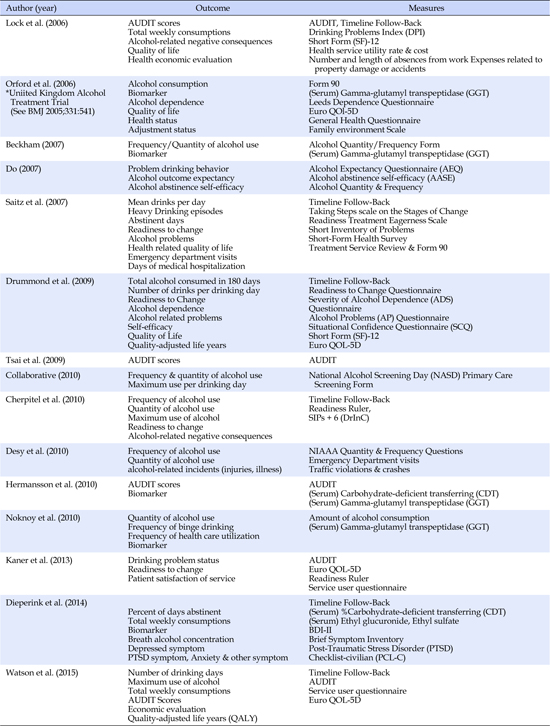Abstract
Purpose
The aim of this study was to describe the core components of interventions for prevention of alcoholism in adults and to present basic information for developing intervention programs for problem drinkers.
Methods
The key words, ‘alcoholism’ and ‘prevention’ were used to search peer-reviewed evidence through ten electronic databases. Six electronic databases in English and four in the Korean language were searched to identify studies done between January 2005 and December 2015.
Results
Examination of the fifteen articles revealed six kinds of interventions for prevention of alcoholism: Screening, Brief intervention, and Referral to Treatment (SBIRT); Brief Negotiate Interview (BNI); Motivational Enhancement Therapy (MET); Screening Interventions Program for Sensible Drinking (SIPS); Stepped Care (SC) and Alcohol Reduction Program. Interventions were mainly focused on assessment of drinking behavior, investigation of alcohol-related problems, building a motivation for change, exploring the expectancies of drinking alcohol, strengthening change of behavior and continuous monitoring using motivational interviewing, empathetic feedback and coaching strategy.
Conclusion
Findings show that the core components of interventions for prevention of alcoholism in adults are client-tailored approaches, formation of motivation to change, and continuous monitoring of behavior change. Motivational intervention is necessary to develop practical strategies to promote motivation to change for problem drinkers.
Figures and Tables
Table 1
Characteristics of Included Studies (N=15)

BI=Brief intervention; MET=Motivational enhancement therapy; FRAMES=Feedback, responsibility, advice, menu, empathy, self-efficacy; SC=Stepped care; BNI=Brief negotiate interview; SIPS=Screening intervention program for sensible drinking; RCT=Randomized controlled trial; Exp=Experimental group; Cont=Control group.
Appendices
Appendix 1
Studies Included in Meta-Analysis
Beckham N. Motivational interviewing with hazardous drinkers. J Am Acad Nurse Pract. 2007;19(2):103-10. https://doi.org/10.1111/j.1745-7599.2006.00200.x
Cherpitel CJ, Korcha RA, Moskalewicz J, Swiatkiewicz G, Ye Y, Bond J. (2010). Screening, brief intervention, and referral to treatment (SBIRT): 12-month outcomes of a randomized controlled clinical trial in a Polish emergency department. Alcohol Clin Exp Res. 2010;34(11): 1922-8. https://doi.org/10.1111/j.1530-0277.2010.01281.x
Collaborative AESR. The impact of screening, brief intervention and referral for treatment in emergency department patients' alcohol use: a 3-, 6- and 12-month follow-up. Alcohol Alcohol. 2010;45(6):514-9.
Desy PM, Howard PK, Perhats C, Li S. Alcohol screening, brief intervention, and referral to treatment conducted by emergency nurses: an impact evaluation. J Emerg Nurs. 2010;36(6):538-45. https://doi.org/10.1016/j.jen.2009.09.011
Dieperink E, Fuller B, Isenhart C, McMken K, Lenox R, Pocha C, et al. Efficacy of motivational enhancement therapy on alcohol use disorders in patients with chronic hepatitis C: A randomized controlled rial. Addiction. 2014;109(11):1869-77. https://doi.org/10.1111/add.12679
Do EY. The effects of the drinking reduction program adopting transtheoretical and leisure models on problem drinking behavior and cognition. J Korean Acad Community Health Nurs. 2007;18:363-72.
Drummond C, Coulton S, James D, Godfrey R, Parrott S, Baxter J, et al. Effectiveness and cost-effectiveness of a stepped care intervention for alcohol use disorders in primary care: pilot study. Br J Psychiatry. 2009;195(5):448-56. https://doi.org/10.1192/bjp.bp.108.056697
Hermansson U, Helander A, Brandt L Huss A, Ronnberg S. Screening and brief intervention for risky alcohol consumption in the workplace: results of a 1-year randomized controlled study. Alcohol Alcohol. 2010;45(3):252-7.
Kaner E, Bland M, Cassidy P, Coulton S, Dale V, Deluca P, et al. Effectiveness of screening and brief alcohol intervention in primary care (SIPS trial): pragmatic cluster randomised controlled trial. British Medical Journal (BMJ). 2013;346:e8501. https://doi.org/10.1136/bmj.e8501
Lock CA, Kaner E, Heather N, Doughty J, Crawshaw A, McNamee P, et al. Effectiveness of nurse-led brief alcohol intervention: a cluster randomized controlled trial. J Adv Nurs. 2006;54(4): 426-39. https://doi.org/10.1111/j.1365-2648.2006.03836.x
Noknoy S, Rangsin R, Saengcharnchai P, Tantibhaedhyangkul U, McCambridge J. RCT of effectiveness of motivational enhancement therapy delivered by nurses for hazardous drinkers in primary care units in Thailand. Alcohol Alcohol. 2010;45(3):263-70.
Orford J, Hodgson R, Copello A, John B, Smith M. Black R, Fryer K, et al. The clients' perspective on change during treatment for an alcohol problem: qualitative analysis of follow-up interviews in the UK Alcohol Treatment Trial. Addiction. 2006;101:60-8. https://doi.org/10.1111/j.1360-0443.2005.01291.x
Saitz R, Palfai TP, Cheng DM, Horton NJ, Freedner N, Dukes K, et al. Brief intervention for medical Inpatients with Unhealthy Alcohol Use: A randomized, controlled trial. Ann Intern Med. 2007;146(3):167-76. https://doi.org/10.7326/0003-4819-146-3-200702060-00005
Tsai YF, Tsai MC, Lin YP, Chen CY. Brief intervention for problem drinkers in a Chinese population: a randomized controlled trial in a hospital setting. Alcohol Clin Exp Res. 2009;33(1):95-101. https://doi.org/10.1111/j.1530-0277.2008.00815.x
Watson H, Godfrey C, McFadyen A, Mcarthur K, Stevenson M, Holloway A. Screening and brief intervention delivery in the workplace to reduce alcohol-related harm: a pilot randomized controlled trial. Int J Nurs Stud. 2015;52(1):39-48. https://doi.org/10.1016/j.ijnurstu.2014.06.013
References
1. Ministry of Health & WelfareKorea Centers for Disease Control & Prevention. Korean health statistics 2014 I: Korea National Health and Nutrition Examination Survey (KNHANES-VI-2) [internet]. Seoul: Ministry of Health & Welfare;2015. 12. cited 2016 Mar 15. Report No. KCDC 11-1351159-000027-10. Available from:https://knhanes.cdc.go.kr/knhanes/index.do.
2. Neumann T, Linnen H, Kip M, Grittner U, Weiβ-Gerlach E, Kleinwchter R, et al. Does the alcohol use disorders identification test-consumption identify the same patient population as the full 10-item alcohol use disorders Identification test. J Subst Abuse Treat. 2012; 43(1):80–85. DOI: 10.1016/j.jsat.2011.10.021.

3. Ministry of Health & Welfare. Korea Centers for Disease Control & Prevention. Korean health statistics 2014 II: Korea National Health and Nutrition Examination Survey (KNHANES-VI-2) [Internet]. Seoul: Ministry of Health & Welfare;2015. 12. cited 2016 Mar 15. Report No. KCDC 11-1351159-000027-10. Available from:https://knhanes.cdc.go.kr/knhanes/index.do.
4. Chung YH, Ko SJ, Choi EJ, Choi YC, Kim EJ. Socioeconomic cost of alcohol and cost-effectiveness of interventions to reduce alcohol-related harm. Seoul: Korea Institute for Health and Social Affairs & Korea Health Promotion Foundation;2012. 09. Report No. KHPF Policy 2012-12-7.
5. Ministry of Health & Welfare. The epidemiological survey of mental disorders in Korea. [Internet]. Seoul: Ministry of Health & Welfare;2011. 12. cited 2016 Mar 15. Available from:http://www.mohw.go.kr/front_new/jb/sjb030301vw.jsp?PAR_MENU_ID=03&MENU_ID=032901&CONT_SEQ=1443&page=1.
6. Benton SA. Understanding the high-functioning alcoholic: professional views and personal insight. Westport: Greenwood Publishing Group;2009. p. 220.
7. Park BK. Alcoholism from the perspectives of stress. Korean J Str Res. 2007; 15:307–313.
8. Nam KA. An investigation into psychosocial variables associated with alcohol-related problems of college students. J Korean Acad Psychiatr Ment Health Nurs. 2009; 18(4):501–511.
9. Institute of Medicine. Broadening the base of treatment for alcohol problems. Washington: National Academy Press;1990. p. 644.
10. Babor TF, McRee BG, Kassebaum PA, Grimaldi PL, Ahmed K, Bray J. Screening, brief intervention, and referral to treatment (SBIRT): toward a public health approach to the management of substance abuse. Subst Abus. 2007; 28(3):7–30. DOI: 10.1300/J465v28n03_03.

11. Miller WR, Zweben A, DiClemente CC. Motivational enhancement therapy manual: a clinical research guide for therapists treating individuals with alcohol abuse and dependence (Vol. 2). Maryland: National Institute on Alcohol Abuse and Alcoholism;1992. p. 121.
12. Do EY. The effects of the drinking-reduction program adopting transtheoretical and leisure models on problem drinking behavior and cognition. J Korean Acad Community Health Nurs. 2007; 18:363–372.
13. Yoo CY. A study of effectiveness of group program for domestic violent offender’s problem drinking. Korean J Soc Welf Stud. 2002; 20:85–116.
14. Chang SM. Development and effects on program for decreasing violent behaviors of the spouse abuse with drinking problems: applying motivational enhancement therapy. Korean J Soc Welf Stud. 2004; 56:103–126.
15. Whittemore R, Knafl K. The integrative review: updated methodology. J Adv Nurs. 2005; 52:546–553. DOI: 10.1111/j.1365-2648.2005.03621.x.

16. Kim SJ, Kim SH, Lee JE, Kim HY, Yoo SY, Oh JA. An integrative review on nursing studies related to humor. Child Health Nurs Res. 2014; 20(1):58–66. DOI: 10.4094/chnr.2014.20.1.58.

17. Higgins JPT, Green S, editors. The Cochrane Collaboration. Cochrane Handbook for Systematic Reviews of Interventions Version 5.1.0 [Internet]. 2011. cited 2016 Mar 15. Available from:http://www.handbook.cochrane.org.
18. Babor TF, Higgins-Biddle JC, Saunders JB, Monterio MG. The alcohol use disorders identification test: guidelines for use in primary care [Internet]. Geneva: World Health Organization;2001. cited 2016 Mar 15. Report No. WHO MSD/MSB/01.6a. Available from:http://apps.who.int/iris/bitstream/10665/67205/1/WHO_MSD_MSB_01.6a.pdf.
19. Joe KH, Chai SH, Park AR, Lee HK, Shin IH, Min SH. Optimum cut-off score for screening of hazardous drinking using the Korean version of Alcohol Use Disorder Identification Test (AUDIT-K). J Korean Acad Addict Psychiatry. 2009; 13(1):34–40.
20. Miller WR, Rollnick S. Motivational interviewing: preparing people for change. 2nd ed. New york: The Guilford Press;2002. p. 482.
21. Drummond C, Coulton S, James D, Godfrey R, Parrott S, Baxter J, et al. Effectiveness and cost-effectiveness of a stepped care intervention for alcohol use disorders in primary care: pilot study. Br J Psychiatry. 2009; 195(5):448–456. DOI: 10.1192/bjp.bp.108.056697.

22. Miller WR, Sovereign RG, Krege B. Motivational Interviewing with problem drinkers: the drinker's check-up as a preventive intervention. Behav Cogn Psychother. 1988; 16:251–268. DOI: 10.1017/S0141347300014129.

23. Miller WR, Rollnick S. Motivational interviewing: helping people change. 3rd ed. New york: The Guilford Press;2013. p. 482.
24. Substance Abuse and Mental Health Services Administration. Enhancing motivation for changes in substance abuse treatment: treatment improvement protocol series 35 [Internet]. Rockville: SAMHSA, US Department of Health and Human services;1999. cited 2016 Mar 15. Report No. HHS (SMA)-12-4212. Available from:https://www.ncbi.nlm.nih.gov/books/NBK64967/pdf/Bookshelf_NBK64967.pdf.
25. Miller WR, Rollnick S. Ten things that motivational interviewing is not. Behav Cogn Psychother. 2009; 37(2):129–140. DOI: 10.1017/S1352465809005128.

26. DiClemente CC, Marinilli AS, Singh M, Bellino LE. The role of feedback in the process of health behavior change. Am J Health Behav. 2001; 25(3):217–227. DOI: 10.5993/AJHB.25.3.8.

27. Whittemore R, Sullivan A. A nurse-coaching intervention for women with type 2 diabetes. Diabetes Educ. 2004; 30(5):795–804.

28. Kang KH, Kim SJ. Affecting factors of intentions to responsible drinking in problem drinkers. Korean J Str Res. 2014; 22(3):121–130.

29. Barnason S, Zimmerman L, Young L. An integrative review of interventions promoting self-care of patients with heart failure. J Clin Nurs. 2011; 21(3-4):448–475. DOI: 10.1111/j.1365-2702.2011.03907.x.





 PDF
PDF ePub
ePub Citation
Citation Print
Print







 XML Download
XML Download